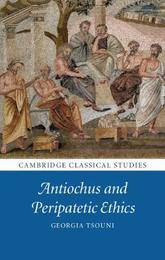
|
Antiochus and Peripatetic Ethics
Hardback
Main Details
| Title |
Antiochus and Peripatetic Ethics
|
| Authors and Contributors |
By (author) Georgia Tsouni
|
| Series | Cambridge Classical Studies |
|---|
| Physical Properties |
| Format:Hardback | | Pages:234 | | Dimensions(mm): Height 224,Width 144 |
|
| Category/Genre | Philosophy
Western philosophy - Ancient to c 500
Ethics and moral philosophy |
|---|
| ISBN/Barcode |
9781108420587
|
| Classifications | Dewey:186.2 |
|---|
| Audience | | Postgraduate, Research & Scholarly | |
|---|
| Illustrations |
Worked examples or Exercises
|
|
Publishing Details |
| Publisher |
Cambridge University Press
|
| Imprint |
Cambridge University Press
|
| Publication Date |
7 March 2019 |
| Publication Country |
United Kingdom
|
Description
This book offers a fresh analysis of the account of Peripatetic ethics in Cicero's On Ends 5, which goes back to the first-century BCE philosopher Antiochus of Ascalon. Georgia Tsouni challenges previous characterisations of Antiochus' philosophical project as 'eclectic' and shows how his reconstruction of the ethics of the 'Old Academy' demonstrates a careful attempt to update the ancient heritage, and predominantly the views of Aristotle and the Peripatos, in the light of contemporary Stoic-led debates. This results in both a hermeneutically complex and a philosophically exciting reading of the old tradition. A case in point is the way Antiochus grounds the 'Old Academic' conception of the happy life in natural appropriation (oikeiosis), thus offering a naturalistic version of Aristotelian ethics.
Author Biography
Georgia Tsouni is a post-doctoral researcher and lecturer (Assistentin) to the Chair of History of Philosophy at the Universitat Bern, Switzerland. She has published extensively on Aristotelian/Peripatetic and Stoic ethical and political philosophy, including a new edition and translation of Didymus' Summary of Peripatetic Ethics, which survives in the Byzantine anthology of Stobaeus.
Reviews'All in all, this book is a fine piece of scholarship, providing as it does an accurate analysis of Antiochus' distinctive position in ethics, and specifically his reclaiming oikeiosis-theory for Aristotle and the Peripatetic tradition.' John Dillon, Bryn Mawr Classical Review
|